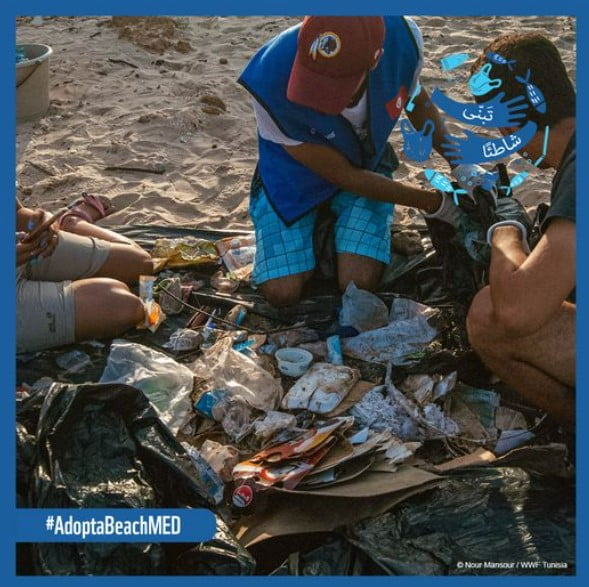After two years of implementation in Greece, the World Wildlife Fund (WWF) “Adopt a Beach” initiative is expanding to the Mediterranean level. WWF national offices in Greece, Turkey and Tunisia are joining forces to develop a pan-Mediterranean coastal pollution monitoring platform.
Press Release
Plastic waste is a growing concern worldwide, and the Mediterranean is no exception. Every year, thousands of tons of plastic end up in the sea, posing a serious threat to marine life. To tackle this problem, WWF North Africa, together with WWF Greece and WWF Turkey, launched the “Adopt a Beach MED” program. This citizen science initiative aims to monitor and collect data on marine litter and raise awareness of plastic pollution in the Mediterranean.
“Adopt a Beach MED” is a youth-led program that encourages volunteers, schools and organizations to adopt specific beaches in Tunisia, Greece and Turkey to monitor and collect data on marine litter. The data collected allows the development of a pan-Mediterranean platform for monitoring marine litter in order to combat plastic pollution in the region.
The Mediterranean is home to over 150 million people and attracts over 400 million tourists every year. Despite its ecological importance, the Mediterranean Sea is heavily polluted, with pollution levels along its coastline being significantly higher than in the Baltic and Black Seas. Marine litter poses a serious threat to aquatic wildlife, contaminating the marine food chain and causing injury or death to marine life.
Tunisia is one of the Mediterranean countries most affected by plastic pollution. According to the Tunisian Ministry of the Environment, the country generates more than 2.5 million tonnes of waste per year, with plastic waste accounting for around 10% of this total. It is estimated that 500,000 tonnes of plastic waste ends up in the sea every year, causing serious environmental damage to marine ecosystems and harming human health.
The “Adopt a Beach MED” program was launched by WWF Greece in 2021 and has since expanded to Turkey and Tunisia. The program has already received a warm response and mobilization from citizens and groups across Greece. Groups of volunteers adopted 149 beaches and recorded a total of 185,857 litter along approximately 14,900 meters of coastline in just two years. The majority of litter found on Greek beaches was plastic (84%), with cigarette butts, small pieces of plastic, plastic straws, plastic bottle caps and small pieces of polystyrene accounting for over 50% of the total waste recorded.
The “Adopt a Beach MED” program aims to raise awareness about plastic pollution in coastal areas and to promote a sense of responsibility and ownership among citizens. By participating in this initiative, young people and volunteer groups from all over the Mediterranean can actively contribute to the reduction of plastic waste and the protection of the natural resources of our planet.
Through collaboration and knowledge sharing, WWF offices based in Tunisia, Greece and Turkey aim to generate meaningful impact and build a better future for wildlife and people. The “Adopt a Beach MED” program is a crucial step towards a cleaner and healthier Mediterranean, and we invite everyone to join this initiative.
For more information on the “Adopt a Beach MED” program, please visit WWF here.

